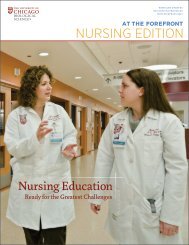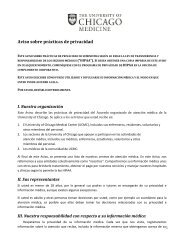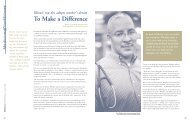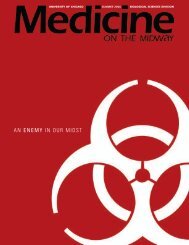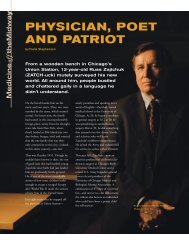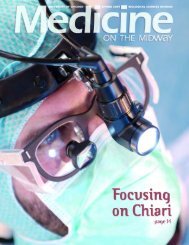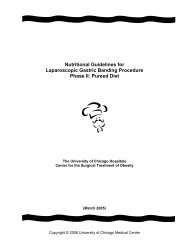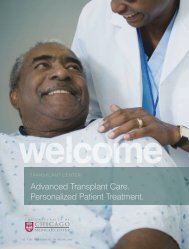Collaborate Explore Discover
University of Chicago Cancer Research Center Scientific Report ...
University of Chicago Cancer Research Center Scientific Report ...
You also want an ePaper? Increase the reach of your titles
YUMPU automatically turns print PDFs into web optimized ePapers that Google loves.
Selected New Funding•• The National Cancer Institute awarded Ravi Salgia, MD, PhD and his colleagues an R01 grant to determine the role ofpaxillin in non-small cell lung cancer (NSCLC), which will help uncover novel mechanisms for transformation, metastasisand, ultimately, therapy for lung cancer.•• Andy Minn, MD, PhD and his colleagues are the recipients of the Department of Defense Era of Hope Scholar Award tostudy how induction of the interferon-related gene signatures for DNA damage resistance by stroma increases treatmentresistance, and how the stroma regulates the lung metastasis signature genes and other metastasis genes.Cell Signaling &Gene Regulation••••Kevin White, PhD is the primary investigator in a program project (P50) funded by the National Institutes of Health tocreate a Center for Systems Biology in an initiative to promote interdisciplinary scientific investigation and educationin Chicago. The focus of this Center’s program is on developing a robust transcriptional network in physiological,developmental, and evolutionary time scales. The goal is being achieved through collaborations among experts ingenomics, developmental biology, evolutionary biology, stress and physiology, network modeling, high performance andgrid computing, chemistry, and physics.Shohei Koide, PhD has been awarded R21 funding from the National Institutes of Health/National Institute for DrugAbuse to develop an innovative and powerful technology platform for facile production of high-performance reagents.This new technology will help to fill a major void in current epigenetic research, making it feasible to establish a standardset of epigenetic capture reagents that can be widely be disseminated to the medical community.New Faculty Recruitments and UCCRC MembersRex Haydon, MD, PhD specializes in the surgical care of bone and soft tissue tumors and aims to understand the underlyingcauses of musculoskeletal neoplasms in order to develop novel and innovative treatments. Dr. Haydon focuses his researchon signaling pathways involved in sarcoma development and on the elucidation of blocks to differentiation that occur inosteosarcoma.Yu-Ying He, PhD’s research interests are in the molecular mechanisms of skin carcinogenesis induced by the environmentand the development of chemopreventive and therapeutic strategies to reduce the skin cancer burden. Dr. He’s currentresearch projects focus on understanding the fundamental mechanisms of cell proliferation, survival, transformation, andinflammation in the skin caused by ultraviolet radiation and other factors.Kathleen Goss, PhD is leading a research program that is aimed at understanding the APC/beta-catenin pathway indevelopment and tumorigenesis in order to facilitate the design of novel therapeutic approaches to target this pathway incancer.Ivan Moskowitz, MD, PhD studies the molecular basis of cardiac morphogenesis and Congenital Heart Disease. Dr.Moskowitz aims to identify and understand the genes involved in cardiac morphogenesis using forward and reverse geneticapproaches in mouse models. Recent work has focused on early aspects of cardiac valve development.Jalees Rehman, MD conducts cardiovascular research on the biology of regenerative stem and progenitor cells. His researchfocuses on cancer stem cell differentiation and cell signaling. Dr. Rehman is also interested in determining the differencesin cell death and metabolism between mature and regenerative cells, and aims to understand how regenerative celltransplantation can improve cardiovascular function in patients.Yingming Zhao, PhD’s research aims to develop mass spectrometry and bioinformatic tools to understand the function ofpost-translational modification (PTM) pathways which play critical roles in disease development. Dr. Zhao combines theuse of proteomic technologies with biochemical and molecular techniques to understand PTM networks further beyond thatprovided by conventional techniques.UCCRC SCIENTIFIC REPORT 200919



